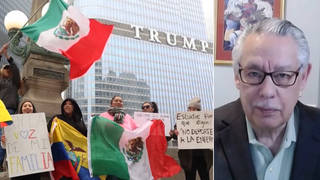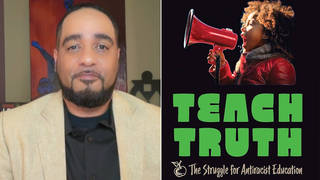
Related
Guests
- Michele Goodwinprofessor of constitutional law and global health policy at Georgetown University.
Abortion rights were a key focus of Thursday’s CNN debate between President Joe Biden and former President Donald Trump, the first to be held since the Supreme Court overturned Roe v. Wade in 2022. Trump took credit for nominating the conservative justices who helped overturn the law, and falsely claimed that Democrats support abortions “even after birth.” “We have no examples of that whatsoever,” says Michele Goodwin, professor of constitutional law and global health policy at Georgetown University. “There is no such thing as abortion after birth.” Goodwin says that while “Americans support reproductive freedom,” Biden’s messaging was weak in the debate.
More from this Interview
- Part 1: “Step Aside Joe”: After First Pres. Debate, Democrats Reeling from Biden Missteps & Trump Lies
- Part 2: “Taking Black Jobs”? Economists Darrick Hamilton & Dean Baker on Inflation & Taxes in Pres. Debate
- Part 3: 2024 Debate: Trump Lies About Abortions After Birth as Biden Fails to Defend Reproductive Rights
- Part 4: Biden-Trump Debate: Silky Shah on How Both Candidates Scapegoat Immigrants, Promote Xenophobic Myths
- Part 5: Biden Boasts of Israel Support in Gaza Assault as Trump Uses “Palestinian” as Slur Against Biden
Transcript
AMY GOODMAN: I’m going to come back to the economy, but I want to go to the issue of reproductive rights right now and abortion. President Trump takes credit for the Supreme Court’s decision to overturn Roe v. Wade, which returned the issue of abortion to the states. During last night’s debate, moderator Dana Bash noted the federal government still regulates access to abortion pills, which are used in about two-thirds of all abortions. This was President Trump’s response to whether he would block abortion medication if reelected.
DONALD TRUMP: And what I did is I put three great Supreme Court justices on the court, and they happened to vote in favor of killing Roe v. Wade and moving it back to the states. This is something that everybody wanted. Now, 10 years ago or so, they started talking about how many weeks and how many this, getting into other things. But every legal scholar, throughout the world, the most respected, wanted it brought back to the states. I did that.
Now the states are working it out. If you look at Ohio, it was a decision that was — it was an end result that was a little bit more liberal than you would have thought. Kansas, I would say the same thing. Texas is different. Florida is different. But they’re all making their own decisions right now. And right now the states control it. That’s the vote of the people.
Like Ronald Reagan, I believe in the exceptions. I am a person that believes. And frankly, I think it’s important to believe in the exceptions. Some people — you have to follow your heart. Some people don’t believe in that. But I believe in the exceptions for rape, incest and the life of the mother. I think it’s very important. Some people don’t. Follow your heart.
But you have to get elected also and — because that has to do with other things. You’ve got to get elected.
The problem they have is they’re radical, because they will take the life of a child in the eighth month, the ninth month, and even after birth. After birth. If you look at the former governor of Virginia, he was willing to do this. He said, “We’ll put the baby aside, and we’ll determine what we do with the baby,” meaning “We’ll kill the baby.”
What happened is we brought it back to the states, and the country is now coming together on this issue. It’s been a great thing.
DANA BASH: Thank you. President Biden?
PRESIDENT JOE BIDEN: It’s been a terrible thing, what you’ve done.
The fact is that the vast majority of constitutional scholars supported Roe when it was decided. Supported Roe. And that was — that’s — this idea that they were all against it is just ridiculous.
And this is the guy who says the states should be able to have it. We’re in a state where in six weeks, you don’t even know whether you’re pregnant or not, but you cannot see a doctor or have your — and have him decide on what your circumstances are, whether you need help.
The idea that states are able to do this is a little like saying we’re going to turn civil rights back to the states, let each state have a different rule.
Look, there’s so many young women who have been — including a young woman who just was murdered, and he went to the funeral. The idea that she was murdered by a — by an immigrant coming in, they talk about that. But here’s the deal. There’s a lot of young women who are being raped by their — by their in-laws, by their — by their spouses, brothers and sisters, by just — it’s just ridiculous. And they can do nothing about it. And they try to arrest them when they cross state lines.
AMY GOODMAN: So, that’s President Biden and former President Trump. We’re joined by Michele Goodwin, professor of constitutional law and global health policy at Georgetown University, founding director of the Center for Biotechnology and Global Health Policy, author of Policing the Womb: Invisible Women and the Criminalization of Motherhood.
Professor Goodwin, your assessment of this discussion of reproductive rights?
MICHELE GOODWIN: Wel, what it exposes is just the chaos that we’re in in the United States in the wake of the Supreme Court dismantling Roe v. Wade and Planned Parenthood v. Casey, which protected a woman’s right to be able to terminate a pregnancy. And at that time, there was no need to lean into exceptions in cases of rape, in cases of incest or in cases where a woman might die. But that’s where we are, including before the Supreme Court just yesterday with its EMTALA decision, which was not full, but, rather, something that was technical.
You see Donald Trump pivoting at the end, noting that this is an election season, so he has modified his position, as sending, basically, a signal to others in his party not to go too hard-line. That is to say that Americans support reproductive freedom. Americans want access to contraception. Americans want access to being able to terminate a pregnancy.
Americans have heard stories after the Dobbs decision about women bleeding out, about girls having to flee one state to another in order to terminate a pregnancy, including a 10-year-old. Americans now know that there are girls going into elementary school and middle school now as mothers after the Dobbs decision. Americans have heard stories about women in Texas, in Tennessee, who wanted their pregnancies but found that they were gestating pregnancies where there was no fetal development, or fetal development but fetuses with no brain, fetuses with no skull, gestating deceased fetuses, and in states where those pregnancies could not be terminated. Americans have heard about Idaho, where doctors have had to put pregnant women on helicopters in order to get them out of the state in urgent situations such that their lives could be spared.
Now, that’s the result of what Donald Trump has boasted about. And as he was running for president, he said he wanted to punish women who wanted to have abortions. What we heard last night is that he’s talked about exceptions and that that’s important to him.
On the other hand, what we’ve heard consistently from the Biden administration is that Roe v. Wade should be codified and that that’s something that Joe Biden would support. There’s legislation in Congress to do that. There are a couple of different bills. The strongest one, that’s received the strongest support, is the Women’s Health Protection Act. And that’s one that he has said that his administration would support.
He has also supported the EMTALA, Emergency Medical Treatment and Labor Act, as applying to these urgent health situations that pregnant women find themselves in. That’s what’s been debated before the Supreme Court in a matter of a technicality. The Supreme Court ruled just yesterday that this is a question that should go back to the states, and, as such, the Supreme Court did not dismantle the Emergency Medical Treatment and Labor Act. The Biden administration said that for patients that are struggling through their pregnancies, this federal law should apply. And indeed it should, because federal law always preempts and trumps state law. But in Idaho, lawmakers there have said that their abortion ban is broad enough to cover EMTALA — that is to say, that their state law should deny pregnant people who are in crisis situations, that their abortion law would not allow them to be spared through this law.
AMY GOODMAN: Professor Goodwin, could you respond to President Trump talking about those who are pro-abortion wanting to kill newborn babies, but also President Biden then talking about you’ve got to be able to have a response to immigrants raping women and women being raped by their sisters?
MICHELE GOODWIN: Well, the first is that there is this Republican talking point, which is not new, so it’s something that he’s picked up on. This was starting before his administration, this kind of messaging. And this messaging is that abortions are dangerous, abortions kill the people that have abortions. We know that that is not true. You’re 14 times more likely to die carrying a pregnancy to term than by having an abortion. The Supreme Court acknowledged that in 2016 in the case Whole Woman’s Health v. Hellerstedt.
But on this point about abortion after birth, it’s been a narrative that’s been pushed by hard-liners. It does not exist. Someone killing a baby after that baby is born, that would be prosecuted. We have no examples of that whatsoever. And, of course, if we did, we would all know about it. It would be promoted by Republicans. We would know the name of the case. We would know the name of the doctors. We would know the name of the individual who sought that abortion after birth. It is not true. But what it does expose is also this loose-baked way in which science and health ends up getting distorted. And Americans have swallowed those soundbites. And so it’s really important that we’re clear that there is no such thing as abortion after birth. There is birth, and if a child is born and then murdered by someone, prosecutors then step in.
On the other hand, what we heard from President Biden about individuals being raped, including being raped by relatives, well, incest does exist. People can be raped and harmed by loved ones, by a brother, a father, an uncle. There are cases of that. There are tragedies associated with that. Right after the Dobbs decision, we heard about a little girl leaving Ohio to get to Indiana in order to terminate a pregnancy, that was not by relative but a close family friend.
President Biden’s messaging did get distracted. And that is distinct from what has been his very firm position of his administration and the messaging of his administration to use everything within their administrative powers in order to protect reproductive health rights and justice for all people. Last night, the messaging got a bit garbled.
AMY GOODMAN: Michele Goodwin, I want to thank you for being with us, professor of constitutional law and global health policy at Georgetown University, author of Policing the Womb.
When we come back, we’re going to look at immigration and foreign policy in this first presidential debate. Stay with us.











Media Options